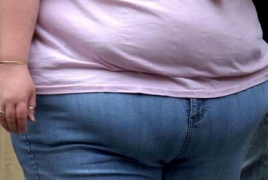 Obesity damages health and economyFactors affecting weight Overweight and obesity are defined as abnormal or excessive fat accumulation that presents a risk to health. A crude population measure of obesity is the body mass index (BMI), a person’s weight (in kilograms) divided by the square of his or her height (in meters). A person with a BMI of 30 or more is generally considered obese. A person with a BMI equal to or more than 25 is considered overweight. PanARMENIAN.Net - Once considered a problem only in high income countries, overweight and obesity are now dramatically on the rise in low- and middle-income countries, particularly in urban settings. Obesity occurs over time when you eat more calories than you use. The balance between calories-in and calories-out differs for each person. Factors that might affect your weight include your genetic makeup, overeating, eating high-fat foods, and not being physically active. Being obese increases your risk of diabetes, heart disease, stroke, arthritis, and some cancers. If you are obese, losing even 5 to 10 percent of your weight can delay or prevent some of these diseases. In the United States, blacks have the highest rate of age-adjusted obesity, at 47.8%. This is one of the most shocking facts: nearly half of all black people in the United States are obese. Hispanics have the second highest rate of obesity at 42.5%. Next are whites, with 32.6% of white people being obese. The ethnic group who are least likely to be obese are Asians, who have only a 10.8% rate of obesity. On average, 17% of children (12 million) in the United States have obesity. Besides taking a huge toll on the human body, obesity also takes a toll on the country’s economy. The estimated annual cost of obesity in the United States was nearly $254 billion in 2013 alone, with treatments for heart disease, stroke, type 2 diabetes, and certain types of cancer, accounting for the highest medical costs associated with obesity. It’s also noteworthy that the extra weight of obesity costs airlines $275 million per year. Not only people but also pets suffer from obesity. Over 34% of adult dogs handled by private veterinarians in the United States are overweight or obese. Studies show that this varies by gender, although female and male dogs that are spayed and neutered are more obese on average than their intact counterparts. Obesity is one of the leading preventable causes of death worldwide. A number of reviews have found that mortality risk is lowest at a BMI of 20–25 kg/m2 in non-smokers and at 24–27 kg/m2 in current smokers, with risk increasing along with changes in either direction. The data that’s available gives a range of between 236,000 and 340,000 people in the U.S., who would still be alive each year if they weren’t obese. Obesity is one of today’s most blatantly visible – yet most neglected – public health problems. Paradoxically coexisting with undernutrition, an escalating global epidemic of overweight and obesity – “globesity” – is taking over many parts of the world. If immediate action is not taken, millions will suffer from an array of serious health disorders, the World Health Organization has warned. According to the Social Progress Index, 15 fattest countries are: Trinidad and Tobago (30%), Venezuela (30.8%), Libya (30.8%), Syria (31.6%), United States (31.8%), Bahrain (32.6%), Mexico (32.8%), Qatar (33.1%), South Africa (33.5%), United Arab Emirates (33.7%), Jordan (34.3%), Egypt (34.6%), Belize (34.9%), Saudi Arabia (35.2%), Kuwait (42.8%). To fight obesity it’s recommended to: -Eat five to six servings of fruits and vegetables daily. -Choose whole grain foods such as brown rice and whole wheat bread. Avoid highly processed foods made with refined white sugar, flour and saturated fat. -Weigh and measure food to gain an understanding of portion sizes. -Balance the food "checkbook." Eating more calories than you burn for energy will lead to weight gain. -Weigh yourself regularly. -Avoid foods that are high in "energy density" or that have a lot of calories in a small amount of food. -Crack a sweat: accumulate at least 30 minutes or more of moderate-intensity activity on most, or preferably, all days of the week. -Make opportunities during the day for even just 10 or 15 minutes of some calorie-burning activity, such as walking around the block or up and down a few flights of stairs at work. Lusine Mkrtumova / PanARMENIAN.Net Marriages by mail Green tourism on the rise in Syunik This winter is ideal for it The cableway, the shoe and the unicycle The growing trend of human microchipping Holy Etchmiadzin prefers solar energy Friendship heals |